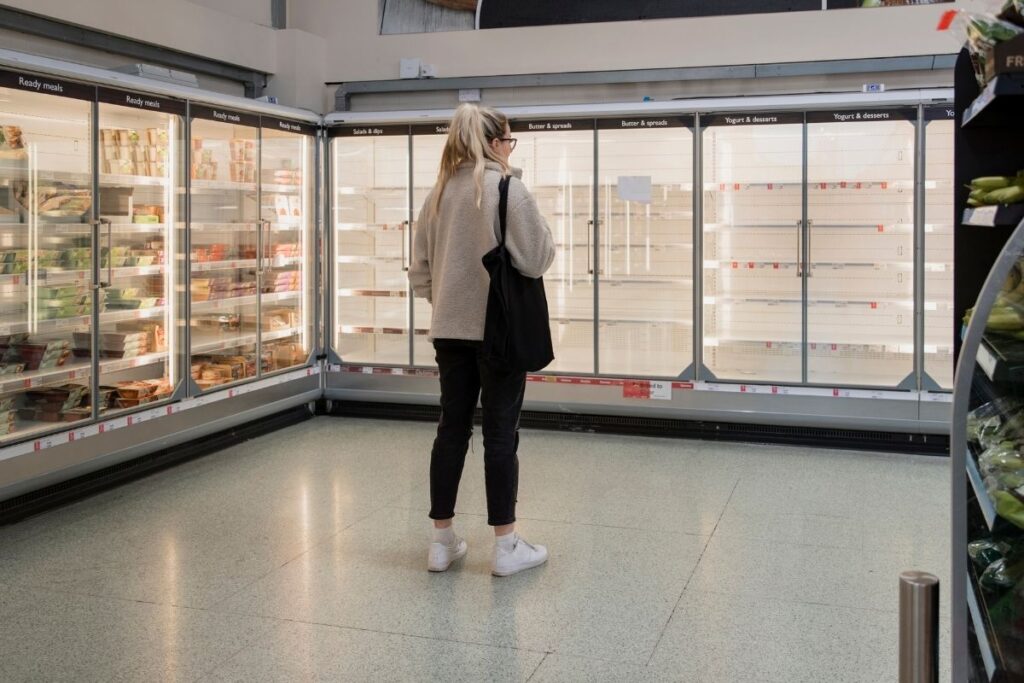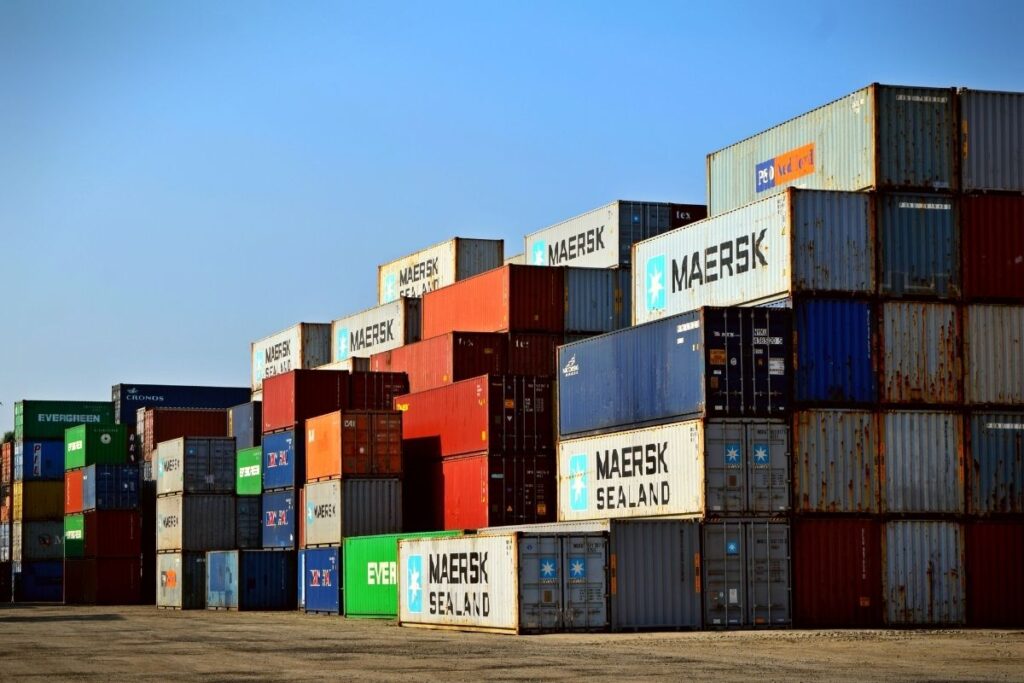Inside: With the current challenges, here is what we should be learning from supply chain problems.
The last couple of years have brought a lot of things to light. One thing the pandemic has highlighted is our dependence on other countries for goods as well as our apparent need to continually buy things.
People shop to feel more secure (hello, toilet paper shortages) and to feel better. During a time of uncertainty, there’s been a massive increase in the purchase of additional goods.
Goodness knows most of our houses don’t need more stuff. There are statistics that tell us just a bit about the clutter problems in our country.
However, the supply chain challenges are shining a light on how we view stuff and the constant need to acquire more.
Here is what we should be learning from the current supply chain problems.

What We Should Be Learning From Supply Chain Problems
Anytime you are faced with different circumstances, you choose how you respond to them. A lot can be learned from the supply chain problems both by examining your current habits as well as your beliefs about stuff.
1. Learn to wait
We live in a consumer culture that is used to instant gratification. We’re accustomed to getting what we want when we want it.
In our Amazon Prime world, most goods show up on our doorstep within two days. The idea that we suddenly can’t get what we want when we want it and seeing empty shelves is shocking for many as it’s not something we’ve experienced before.
The culture reinforces impatience. Commercials have gotten shorter as well as attention spans.
We’ve gotten comfortable with our ideas of how the world works and being forced to wait for many months for things is not something most of us have had to do.
However, even in unfortunate circumstances we can learn important lessons and grow in different areas. Being more patient would be good for us all!
2. Decide what is necessary
The last couple of years have made us look at what’s really important in life and the supply chain problems are teaching us that too.
No one comes to the end of their life and wishes they had more stuff to leave behind. Stuff isn’t what makes us happy and most people own far more than what is necessary.
Advertisers have done a good job at convincing people that whatever it is they’re selling is necessary. And that has furthered the addiction to cheap goods and the serotonin dump that comes along with buying something new.
Decluttering is a very clarifying experience. As you go through the items in your home you see which things you bought that you were sure you’d use that were in fact used very little, if at all.
The process of deciding what stays and what goes helps you see what is truly necessary as does the lack of readily available goods to purchase. When you aren’t able to make impulse purchases or buy things you think you need, but maybe truly don’t, it becomes more clear what is actually necessary.

3. Make do with what you have
When new items aren’t readily available online or in stores, it requires you to make do with what you already have.
Have you heard the Plato quote “necessity is the mother of invention”? When you’re forced to do things differently, you figure it out.
People find various ways to problem solve and use the resources available to them. Creative solutions can come out of unexpected situations.
In a culture that is used to immediate resolve, resilience and resourcefulness are useful skills to develop and refine.
4. Redefining what matters most during the holidays
You likely have heard by now the ‘importance’ of shopping for Christmas gifts early due to the supply chain problems.
What if instead of stressing out about buying the best gifts this year, people focused on simplifying the holidays instead?
Instead of trying to keep everything the same this year, let’s learn from the supply chain problems and take this as an opportunity to revisit gifts and expectations this holiday season.
The truth is that many people find themselves in debt from purchasing gifts each Christmas. In 2020, the average American got into $1300 worth of holiday debt.
Instead of jumping on the bandwagon to get all of the shopping done early, we can learn from the supply chain problems by questioning what we’re spending in the first place.

Take-Aways to Learn from Supply Chain Problems
Here are a few of the takeaways we can learn from supply chain problems.
Be more intentional with shopping
Resist the hype and don’t purchase more than intended for the holidays right now. The scarcity of goods influences the choices people make. Don’t let it impact your decisions.
Avoid buyer’s remorse by being more intentional with shopping.
Consider changing some of your gift-giving habits this year and focus on creating memories instead.
That doesn’t mean you have to completely do away with giving any physical gifts. Just go in with eyes wide open and carefully consider the choices you’re making. Be open to trying new things this year to see how it goes.
Don’t get caught up in the shopping frenzy just because other people might be. Use this as your opportunity to do things differently this year.
Experiences are the best gifts
The supply chain challenges are a great reason to gift more experiences this year. Experience gifts provide memories that last long after the toys are outgrown or gadgets are forgotten.
Studies have shown that children do better with fewer options of toys to play with. Instead of unnecessarily adding to their toy stash, consider gifting an experience or consumable gift.
Get creative with clutter-free gifts that are useful and will be enjoyed without adding to the stuff in the recipient’s home.

Redefine wants vs needs
The last couple of years have forced simplifying on us in some ways whether we were ready for it or not. There are lessons to be learned in the process and some good can come out of it.
Redefining what your wants vs your needs are is helpful for both budgeting and life. You can save more money as you get a better handle on discretionary spending.
Not being able to order what you want right away can be a benefit in disguise. This can be an opportunity to reprioritize your finances and simplify your life while saving more money.
Appreciate what you have
Patience is never something that anyone wants to learn, but it’s likely something all of us could do a bit better at. When we aren’t forced to wait, it’s easier to become impatient because we’re simply used to getting what we want quickly.
We’ve been waiting to buy a house for years. We never intended to stay in our rental as long as we have. We’ve learned to love things about where we live which is good as the current circumstances are causing us to wait longer.
When markets go crazy or supply chains get interrupted, we can choose to either be impatient or to be thankful for what we already have. Perspective is everything.
What have you learned from the supply chain problems? Share it in the comments!
Sign up on the form below to get weekly tips on simplifying and living intentionally sent straight to your inbox. You’ll also get the free 8 Quick Wins for Decluttering Checklist to help you start simplifying today.


Love this post Julianna. I have definitely learned a lot from the supply chain problems.
My dads business is still crippled but he silicone chip shortage affecting the car industry so I have learned that money and a stable business can change overnight but our love for one another and flexibility due to a simple life are what will help you get through.
My mom has taught me to stock up on food a little more than I did before and to be more resourceful when we don’t get what we want from the store.
I have learned that my stuff is only as valuable as it is useful as my nicer clothes languish in the closet.
I think we have all learned some patience and I hope we have learned to think of others and not just hoard all the toilet paper and cleaning supplies for ourselves.
When first out of college in the 1980’s, I worked for a major computer company in one of their new product areas. Computer chip design engineers in the company decided to ask a well=known Japanese chip company if they could manufacture the new design cheaper than we could make it within the company. They said they could, and the design was handed over to them. Well, they made it, but afterwards only agreed to a volume of 2,000 chips, nowhere near the volume needed. It shut down the product development. A few months later, the Japanese company came out with a new design, coincidently very similar to the one our engineers had foolishly given away. So chip shortages are nothing new. Frankly, I want the next car I buy to be simple, if I can find such a thing, without computer chips that control everything and are subject to failure. Computer chip designs also mean you are stuck going to a dealer for repairs, not to your local mechanic. Keep your transportation simple too. The planet will thank you.